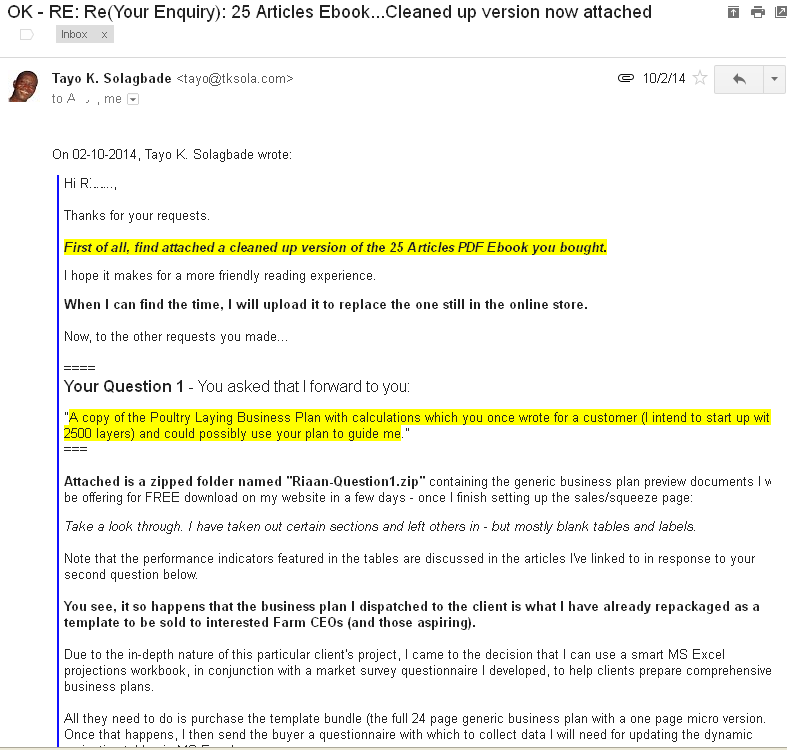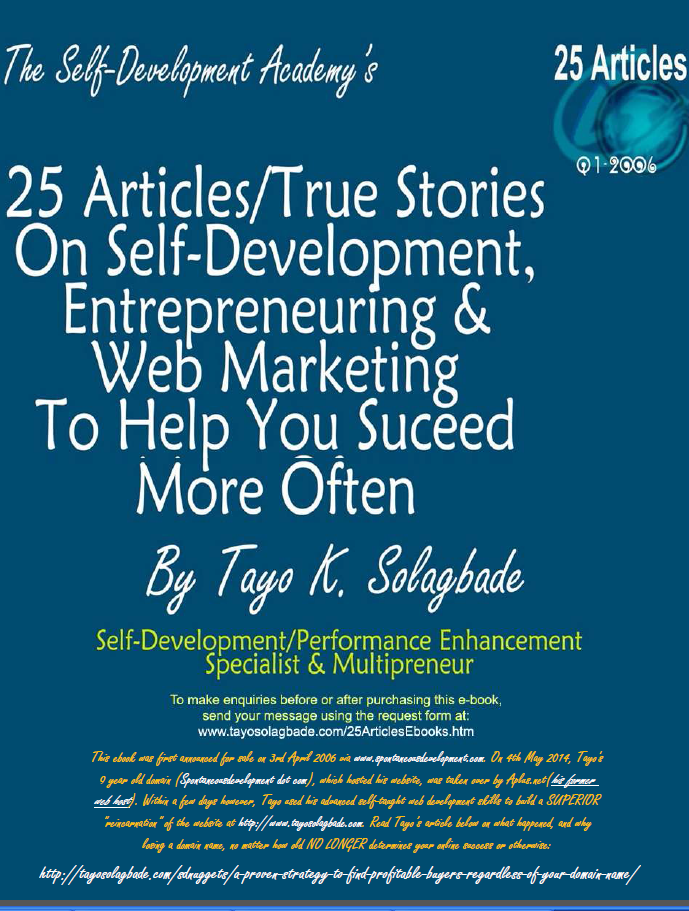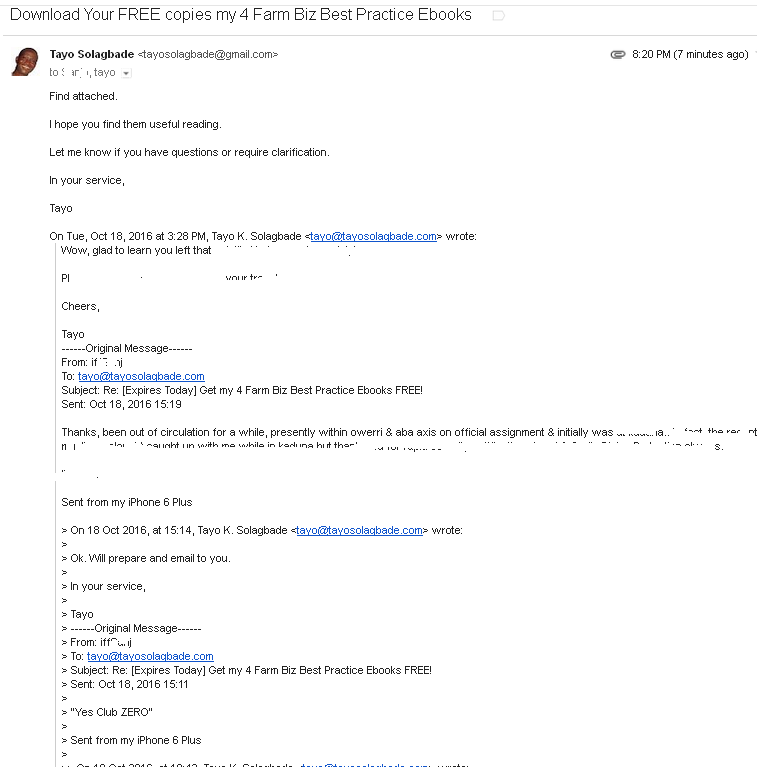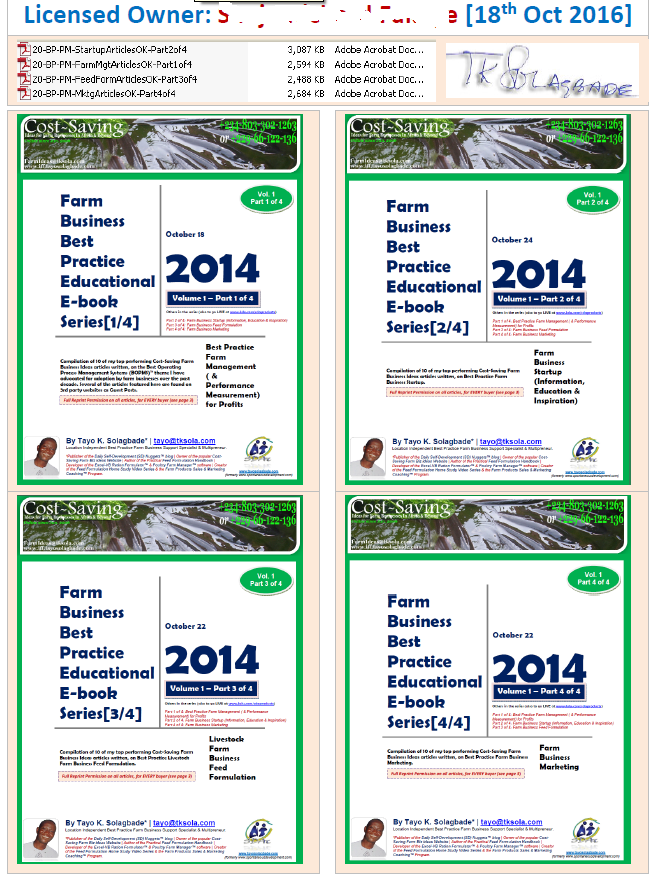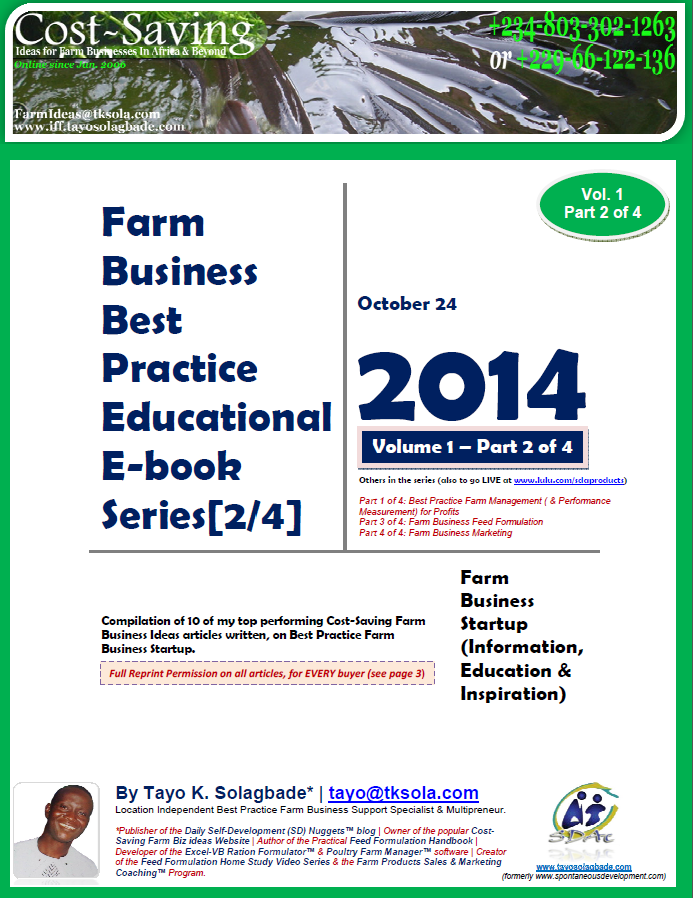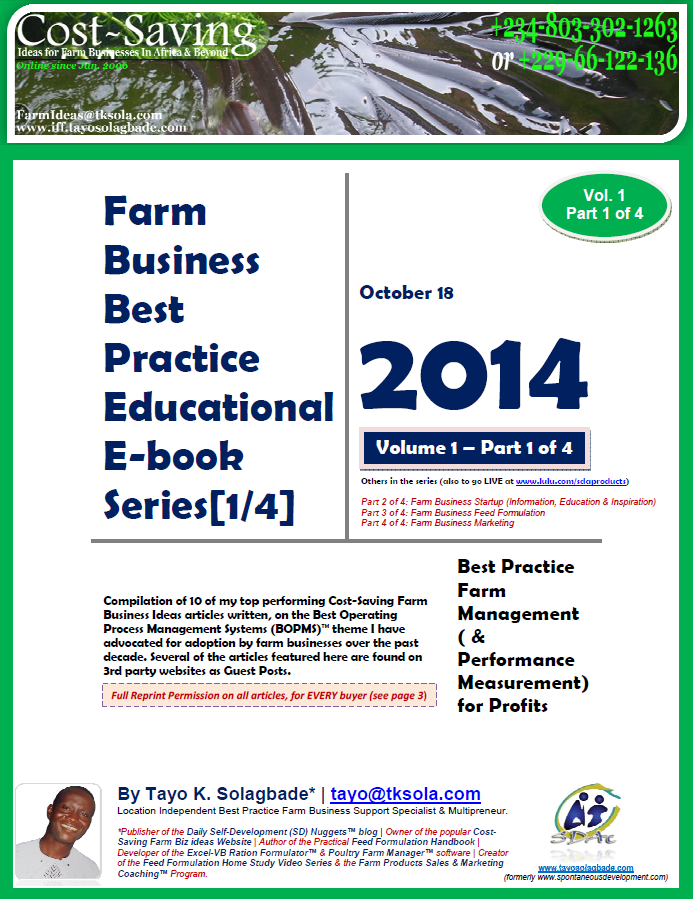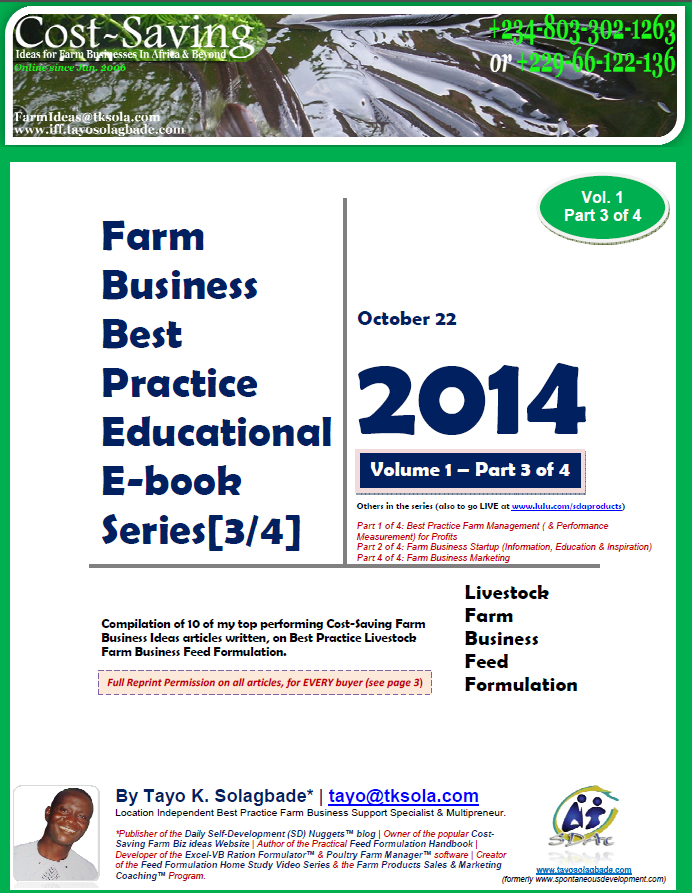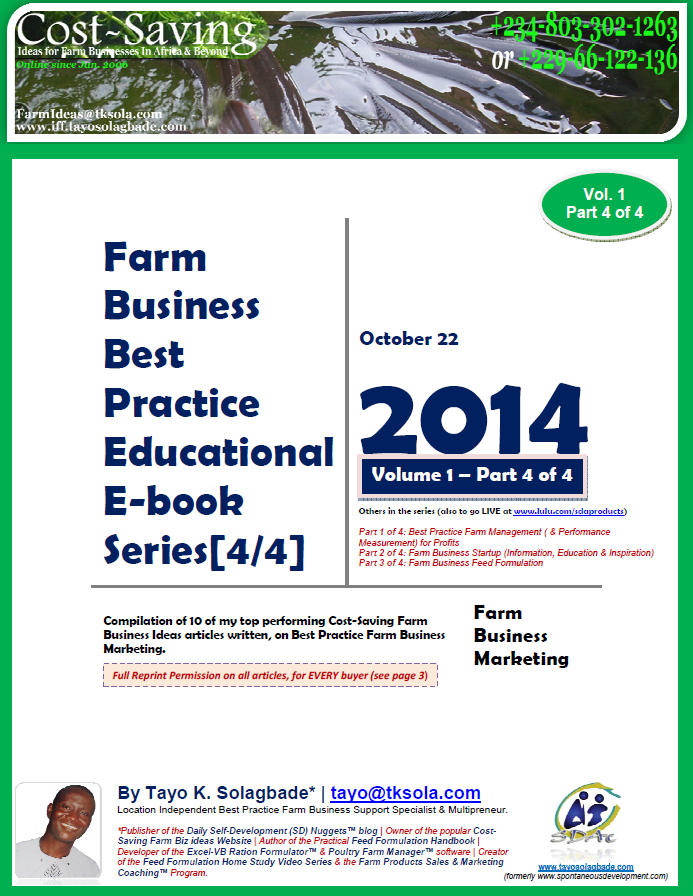Category Archives: Farm Biz
[PDF] 25 Articles/True Stories On Self-Development, Entrepreneuring & Web Marketing To Help You Succeed More Often: Get this $25 USD ebook FREE!
Quick Take-Away: Click here to fill/submit a request form (scroll to the bottom of the page that opens) to request details of how you can get this $25 USD ebook FREE from me.
It’s always exciting to have people fitting my target audience profile sending me messages that confirm I’m adding tangible/useful value to them. Like this Namibian professional planning to start a 2,500 layer poultry – who found me via my $25 USD ebook (25 Articles/True Stories On Self-Development, Entrepreneuring & Web Marketing To Help You Succeed More Often) a gift copy from his boss:
name = rixxx dxxxx
submit_by = [email removed]
company = Production Metallurgist
address = berg str
city = 189
states = —
country = Namibia
phone = [phone removed]
how_found = I read about your ebook 25 articles on the internet…
interest = Poultry Farming
comments = My boss gave me your ebook on the 25 articles on self-development as a present. However, I am struggling to contact you in order to get the links in the book to become functional. Can you possibly e-mail me the contact form so that I can send you a copy of the invoice. As it stands, I do not have access to all the articles in the ebook
Below: Screenshot of reply email I sent, with the updated ebook attached.
Click here to read the full email conversation we went on to have…
Below: Screenshot of the ebook on sale in my Lulu.com online store
This ebook has been on sale for 10 years now. It was my first ever articles compilation ebook and it has been quite popular. People LOVE the contents and the fact that they have my permission to freely reproduce it for their use.
Click here to fill/submit a request form (scroll to the bottom of the page that opens) to request details of how you can get this $25 USD ebook FREE from me.
RELATED ARTICLE:
Any Society Can Give Kids Quality Low to Zero Cost Schooling Using This Model [Recommended: Is this the world’s most oversubscribed school? – BBC News]
Jerry Rawlings once granted an interview in which he explained the motives he had for seizing power and introducing radical reforms in Ghana,.
He said one reason was that he saw massively gifted kids of the poor getting denied acCess to quality schooling exposure and opportunities simply because they lacked the financial/other means (e.g connections) of privileged counterparts from rich homes.
As a result, the country was NOT benefiting from development of its best talents. Rawlings resolved to create a level playing field for all kids regardless of their circumstances.
In Nigeria today we have adults/parents who enjoyed FREE education, but who are actively involved in promoting extreme commercialisation of quality formal schooling in the face of increasingly low quality public schooling systems.
I have long argued that developing nations in particular, that want real progress must remove the “money” factor that limits people’s access to learning.
The best way to achieve this is to explore models like the one described in the BBC report about this FREE world class school facility – setup by the Shiv Nadar Foundation – providing top quality schooling access to learners without discrimination.
Nigeria has a myriad of “wealth-displaying” individuals, groups and organisations with the resources/means to setup similar outfits. Lord knows there are millions of kids that need it.
However, to paraphrase a friend who shared this report on Facebook, one wonders what they do with the immense wealth they possess!
=
Is this the world’s most oversubscribed school? – BBC News
The school, set up by the Shiv Nadar Foundation, is completely free, and offers the type of education usually available only to the very wealthy.
Roshni Nadar Malhotra, a businesswoman and trustee of the foundation, says the school has been modelled on India’s private schools, which put students on the pathway to top universities and high-flying careers.
But the VidyaGyan school is open only to the very clever and very poor – which she describes as the “top of the bottom of the pyramid”.
Get Equity Funding for Your Biz Idea in Lagos [&/Or Sponsor a prospective buyer of my products!]
1. This outfit offers a useful funding alternative:
Entrepreneurs – Lagos Angel Network
Thank you for your interest in the Lagos Angel Network. We invite entrepreneurs to learn more about our investment screening process.
The Lagos Angel Network uses VC4A, the global platform for connecting high-growth entrepreneurs and active early-stage investors for managing our investment process. Please register your company with us here.
http://www.lagosangelnetwork.net/entrepreneurs/
Visit the above site to learn more and/or click here to request the audio note I emailed to my subscribers.
2. The invitation below first went to my Club ZERO™ members.
Below is a modified version of the invitation for my Farm Ideas Club Members and other clients.
Consider making a N5K donation to sponsor 1 of the guys listed below.
They’ve expressed great interest in purchasing my products but lack funds. I want to help them by asking interested clients to sponsor them.
A. Name removed [Student]
B. Name removed [Student]
C. Name removed [Startup Farm CEO]
The person you choose will get my Feed Formulation Handbook & Excel-VB Ration Formulation Software for N5k instead of N20.5k.
If you’re interested, just make the payment then let me know who it’s for, and I’ll prepare/send the products, with your name as donor.
Any amount is acceptable, no matter how low – I’ll just add it up till N5k is reached for each person.
But I’ll send the products to all 3 of them for a donation of N10k.
For every person you sponsor with N5k, I’ll give you a discount of N10k on any of my products or services that you want.
Get YOUR FREE Copies of my 4 Farm Biz Best Practice Ebooks on Best Practice Farm Management (& Performance Measurement) for Profits | Farm Business Start-up (Information, Education & Inspiration) | Livestock Farm Business Feed Formulation | Farm Business Marketing [Save $40 USD]
Buy my Excel-VB Ration Formulator app for N7.5k (instead of N12.5k) & Get FREE copies of my 4 Farm Business Best Practice (55/58 page) Ebooks
[*NB:
A. If you already own the Ration Formulator software, reply “Yes BP EBooks Only” via info@thefarmceo.net to pay N3k – less than $6 USD – for the 4 ebooks. You save over $30 USD
B. If you’re a Club ZERO member, you pay NOTHING: just repy “Yes Club ZERO” and I’ll email the 4 ebooks to you]
Offer expires MNT today Tuesday 18th October 2016. Price reverts to N12.5k.
Each ebook is a compilation of 10 of my top performing Cost-Saving Farm Business Ideas articles since 2006 in its chosen theme/category.
1. Best Practice Farm Management (& Performance Measurement) for Profits
55 pages | $9.99 USD
2. Farm Business Start-up (Information, Education & Inspiration)
57 pages | $9.99 USD
3. Livestock Farm Business Feed Formulation
55 pages | $9.99 USD
4. Farm Business Marketing
55 pages | $9.99 USD
Several of the articles featured in the ebooks are Guest Posts on 3rd party websites.
See all 4 ebooks on sale, with their Tables Of Contents at http://tayosolagbade.com/sdn-sell.htm
Get all 4 ebooks FREE if you pay N7.5k (instead of N12.5k) to buy my Excel-VB Ration Formulator app
Offer expires MNT tomorrow Wednesday 19th October 2016. Price reverts to N12.5k.
Click here to fill/submit a request form – scroll to the page bottom.
A Club ZERO™ Member Gets His FREE Farm Biz Best Practice Ebooks
Screenshots of email and products sent to one of my Club ZERO™ members who took up the offer previewed below…
PII 036: You Need to Think before You Spend – Everything is Negotiable!
It pays to form the habit of aiming to get the best possible value for your money.
There are some people who believe a person who is truly financially successful will not fret about costs – and will instead readily pay whatever s/he is asked, since s/he can afford it.
Sadly, those who think – and live – this way often tend to be persons frequently living well above their means, and far from being financially independent.
SCROLL DOWN TO READ FULL ISSUE
|
|
|
Tayo K. Solagbade* Self-Development/Performance Improvement Specialist *Best Practice Farm Business Support Specialist & Founder of the MS Excel Heaven Visual Basic Automation Club and Competition Mobile: +234-803-302-1263 (in Nigeria) or +229-66-122-136 (in Benin Republic) Tayo K. Solagbade is a Location Independent Performance Improvement Specialist and Multipreneur (i.e. a highly versatile/multi-skilled entrepreneur), with a bias for delivering Best Practice solutions to Farm Businesses and others. Since 2002, he has earned multiple streams of income providing individuals and organizations with personal development training and coaching, custom MS Excel-VB solutions, web marketing systems/web hosting, freelance writing services, and best practice extension support services (for farm business owners). Tayo is the author of the Self-Development (SD) Bible™ and the popular Livestock Feed Formulation Handbook. He is also the developer of its accompanying Excel-VB driven Ration Formulator™ and the Poultry Farm Manager™ software. He has delivered talks/papers to audiences in various groups and organizations, including the Centre for Management Development, University of Lagos, Christ Baptist Church, Volunteer Corps, Tantalisers Fast Foods and others. In May 2012 he was the Guest Speaker at the Centre for Entrepreneurship Development’s Annual Semester Entrepreneurial Lecture at Yaba College of Technology in Lagos. On 1st April 2013, Tayo (who reads, write and speaks the French language) relocated to Cotonou, Benin Republic to begin slowly traveling across the West African region. His key purpose is to deliver talks, seminars and workshops on his key areas of focus and interest to interested audiences (Email tayo at tksola dot com for details). In a previous life, before leaving to become self-employed, Tayo served for seven years (October 1994 to December 2001) as a high performing manager in Guinness Nigeria. He rose from Shift Brewer to Training & Technical Development Manager, and later acted in senior roles as Production Manager and Technical Manager. In addition to constantly challenging the status quo and influencing positive work changes, he built a reputation for using self-taught spreadsheet programming skills (starting with Lotus 1-2-3, and later moving to Excel Visual Basic) – in his spare time – to develop Automated Spreadsheet Applications to computerize manual report generation processes in the departments he worked. Over four(4) of his applications were adopted for brewery level reporting. Tayo holds a B.Sc degree in Agricultural Extension Services from the University of Ibadan, Nigeria, having graduated top of his class – with Second Class Upper Division honors – in 1992. He is an Associate Member of the UK Institute & Guild of Brewing, a 1997 National Finalist of the Nigerian Institute of Management’s(NIM) Young Managers’ competition, a Certified Psychometric Test Administrator for Psytech UK, innovator of Spontaneous Coaching for Self-Development™ (SCfS-D™), and Founder of the Self-Development Academy (SDAc). When he’s not amazing clients with his superhuman skills (wink), Tayo works as the creative force behind his Daily Self-Development Nuggets blog – on which he also publishes The Farm CEO Weekly Newspaper (sent via email to paid subscribers) and his Weekly Performance Improvement IDEAS newsletter. You can connect with him on Twitter @tksola.com and Facebook. Visit Tayo Solagbade Dot Com, to download over over 10 performance improvement resources to boost your personal and work related productivity. ====
|
Protected: THE FARM CEO (Issue 62): How to Start a Livestock Feed Production Business with No Money, Future considerations in poultry nutrition, Status of animal nutrition research and development activities…
[Audio Podcast Training] Tested Strategies to Save Money (& Grow Profits) Running YOUR Farm Business
[NB: A special promo of this new product was sent to all members of the Farm Business Ideas Club last night]
[Audio Podcast Training]
Tested Strategies to Save Money (& Grow Profits) Running YOUR Farm Business
Delivery Mode:
Five 30 Minute AMR audio files emailed to you for playback on phone or PC.
Description:
Farm CEOs who correctly apply these secrets will experience increased success with fewer reasons to fret or stress daily.
There are several strategies, but the most powerful of them all yields multidimensional rewards at low to zero cost:
That strategy is: “Reduce Variable Cost Inputs You Have to Spend Cash On!”
How do you do that?
Simply carry out the 5 steps outlined below, and watch your profits grow!
A. Find ways to make/grow variable cost inputs yourself at low to zero cost.
B. If you have to buy them, find ways to pay without cash: Barter Is Smarter.
C. Or find ways to get them without paying upfront I.e so you can later pay the supplier from your inevitable farm sales.
TIP: Cash flow is critical to profitable operation…AND Everything is negotiable!
D. Setup a reliable Variable Costs data recording, analysis and report generation system to facilitate timely and accurate monitoring of your item’s usages – to minimize avoidable losses like wastage or outright theft.
E. Use the historical records from your system to establish best practice control limits that will guide purchase/usage of each item by farm operatives. That way, budgetting/planning for Variable Cost inputs will become more predictable.
Option A: Do IT Yourself:
You can think up ways to implement the above by yourself – Or…
Option B: Signup to Get The Training & Support
In this case, I’ll give detailed explanations of exactly what to do, and how to do it via the 5 part audio series.
Signup Requirements
Text “YES VCR-APTraining”, with your full name and email address to +234 803 302 1263 to request details.
Successful People or Great Achievers Are Not All-Knowing! [Hint: Why YOU Must Never Let Anyone, No Matter How Successful, Dismiss Your Authentic Passion Driven Ideas/Dreams]
In case you didn’t know it, YOU owe YOUR car ownership ability TODAY, to the vision, self-belief, determination and persistence of a man who lacked formal schooling.
Not many people know this, but Henry Ford started out working for THE great Thomas Edison as a stark iliterate.
A testimony to the inspirational power that comes from exposure to the right environment can be seen in the fact that one day Ford (as a so called “stark illiterate”) got the idea to build an affordable car for non-wealthy masses.
This development is easy to understand when one considers the fact that Ford’s employer himself had only few months of elementary schooling, having been homeschooled by his mother.
Ford would have accurately concluded, based on Edison’s exploits, that lack of formal schooling (though useful and easily remedied) was not a fatal handicap in pursuit of success.
Ironically however, when he told his famous inventor boss about his idea, the great Edison dismissed it and instead offered him promotion to the position of Supervisor adding that he would be involved in “more important work”.
That last sentence brings me to the core message I want to pass across in this short piece that ends, below, with a link to a full narration about Henry Ford’s life and achievements.
My message is this:
As long as you believe in your dream or idea or vision and you are prepared to diligently/intelligent pursue it with persistence and faith, nothing that any other person, no matter how successful, should make you quit.
I repeat:
Nothing that any other person tells you should make you give up on your dreams. My hard-won experience from 7 years in paid employment plus 14 years (and counting) in self-employment have taught me not all great minds will see what another great minds can see.
This is why, for instance, I personally do NOT like competitions that depend on celebrities to choose people with the best business ideas, musical talents etc.
Fela Anikulapo Kuti continues in death to grow in recognition across the world, as a musical genius.
The truth is however that the kind of music Fela invented is very unlikely to have won him first prize in a reality TV show style event where judges and coaches have the final say.
We all know how contrarian Fela was, even as a young man. Yet those attributes that would have rubbed opinionated celebrity judges and coaches the wrong way in such competitions were the keys to his success in the real world.
This is why I believe the “market” for which an idea, invention or innovation is meant, should have the final say via a system that is free from manipulation.
This message is not just for you/me, but also for your/my kids.
We need to help our kids develop healthy levels of self-esteem based on the experience of doing in key areas of life that relates to nurturing their talents/geniuses towards succeeding in life.
This is important because during that journey, they will periodically come across successful others from whom they may have to learn and also accept advice.
It’s however their ability to know what NOT to learn or accept, no matter how well intentioned it is, that will help them stay on track to success in any area of endeavour.
Successful People or Great Achievers Are Not All-Knowing!
Most of them are aware of this fact, but societal pressures sometimes force them to accept to play roles that suggest the contrary.
If Henry Ford had allowed his respect and admiration for Edison to cloud his reasoning about his “car for the masses” idea, he would never have had the courage to reject Edison”s offer, and instead quit his job to invest all he had in pursuit of his dream.
If he had not done that, the revolution that took place in the automobile industry would not have happened.
Simply put therefore, vision, self-belief, determination and persistence are constant keys to authentic success in life. All other factors are variables in the success equation.
=============
The Henry Ford Story
=============“I will build a motor car for the great multitude.it will be so low in price that no man will be unable to own one.”-Henry Ford
Henry Ford was nearly 40 when he founded Ford Motor Co. in 1903. At the time, “horseless carriages” were expensive toys available only to a wealthy few.
Yet in just four decades, Ford’s innovative vision of mass production would not only produce the first reliable, affordable “automobile for the masses,” but would also spark a modern industrial revolution.
https://www.entrepreneur.com/article/197524
Get Your Anti Recession Insulator™ Product FREE [Details Inside]
I don’t bother myself with hype in my messages – because it NEVER attracts people with the right mindset to fit into my target audience profile.
That’s why I share experience based true stories, mixed with a sprinkling of verifiable results, that combine to attest to the veracity of my claims.
Such messages have continued to attract authentic serious minded results-focused DOERS and ACTION TAKERS to me!
Yep.
People like the above indicated have often made the best clients for me 
For instance, in less than 18 hours of sending yesterday’s email on the above theme to my list (click here to read), I’ve gotten over 15% web form replies to my offer of details about “What You Need to Do, to Get My Recession-Proof Income Generating FREE Product Creation Service.
15% is a hefty response rate.
17% is industry standard for email open alone – so to have 15% taking the step to submit form requests is proof that this message resonates with my audience.
Chances are good that you also want details of how you can get my FREE service.
If YES, read on…
One of the form requests came from a Poultry Layer Farm CEO client based in Kaduna, who wrote as follows in the comments field:
***
comments = It’s always a good idea to diversify ones so source of income
****
And that’s the point I’m making with this initiative: The need to generate Multiple Streams of Income – regardless of what you do as your main vocation or profession!
Below is an excerpt from the full email details message I’ve sent to each web form requester so far:
:
Fill and submit the web form linked at the bottom of the excerpt, to request that I send you the full offer message, complete with JPEG mindmap, PDF report and AMR audio primer you can listen to on your phone or PC.
***Email excerpt starts***
[Title]: Re: Re(Your Web Form Submission): What You Need to Do, to Get my FREE Product-Creation-Service
[Body]: Below I describe 5 forms of Recession-Proof Income Generating Product I can Create at Zero Cost for YOU [In 30 Working Days]
I end by specifying what you need to do, to get this FREE product-creation-service.
[TIP: Before you start reading I need to impress a very important point on you – that products you create and sell using this strategy/approach I recommend, need NOT even have anything to do with the business you run, the day job you do – or indeed what you majored in at school!
Listen to the attached audio clip in which I give a brief explanation using my own real life products as examples]
…Listen to the attached 15 minute audio primer…
Now, with the understanding you’ve gained from listening to my clarification in the audio, reading what follows below should open your inner eyes to a wider range of product creation possibilities for now and into the far future…!
***Email excerpt ends***
Fill and submit the web form linked below to request the full message, complete with the JPEG mindmap, PDF report and AMR audio primer you will begin with.
http://www.tayosolagbade.com/contact.htm

